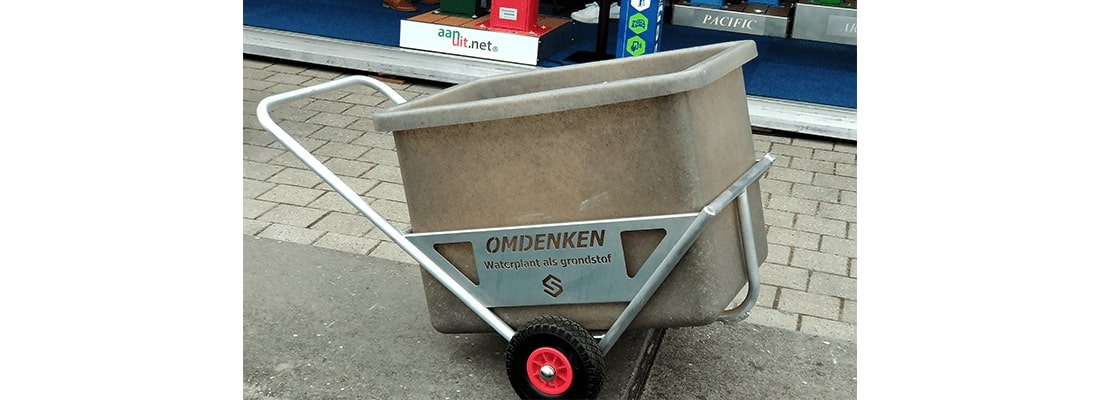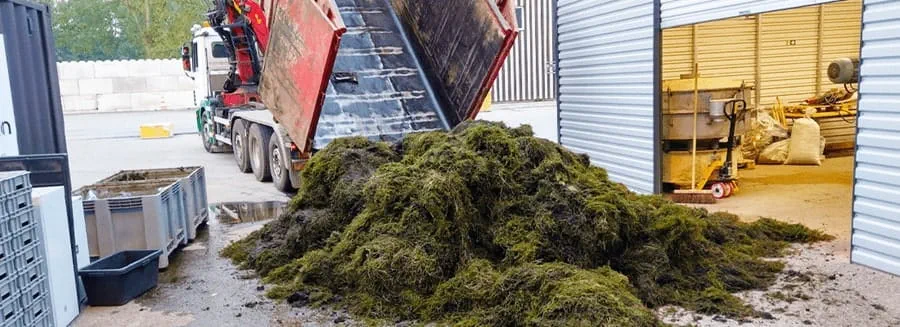Visitor records were broken earlier this month, at the 36th edition of the HISWA in-water boat show. Around 30,000 people ignored (or braved) the typically changeable Dutch weather, and travelled to Lelystad where the event was held for the second year, since moving from its previous Amsterdam Marina site.
As always, we look for something with an environmental sustainability theme at boat shows, and having written an article about the dramatic increase in underwater plant growth following last summer’s heatwave conditions, we were instantly drawn to an exhibit on the Seijsener stand. Seijsener are regular exhibitors at METSTRADE, and since 1963, they have been specialised in providing technical infrastructure products and services to marinas, ports, and inland waterways.
A green baggage transporter.
In front of the Seijsener stand at the show stood a typical baggage trolley on wheels, the type that every marina and camp site provides for their customers, in order to move their belongings and provisions from their car, to their boat or caravan. Nothing unusual about that, a sturdy plastic composite box on wheels…but hang on, it is green in colour, but it’s also green in its construction material! In fact, the box is made of a bio composite material, 50% of which is produced directly from water plants that have been ‘mowed’ from the Netherlands waterways.
Bas Durieux, the director of Seijsener explained more ; “I spoke with the manager of the Marina Muiderzand in Almere, one of the largest in the Netherlands, where they suffer a lot from the growth of aquatic plants in the summer. They were happy that the plants were mowed and recovered, as it then leaves the waters inside the harbour unhindered for navigation. But at the same time, they thought it was a pity that the waste was thrown away. They thought that more should be possible with the plants, and maybe even put them back into marina equipment.”

Bas then contacted another Dutch company, Millvision, an organisation that has been working for years to make various materials from all kinds of natural elements. For example, it turns wood fibers, old paper, grass, hemp, leaves and algae into new raw materials. The company also started experimenting with the recovered water plants, and among other things, it turned out to be a great product to make paper from.
They also discovered that it can be mixed very successfully with other resins to make things like eco-friendly plant pots from a new bioplastic. And from this concept, came the idea to make the Seijsener baggage trolley which was on show at the HISWA Show. According to Durieux, this is only the beginning, and he believes that other products in the company’s range, such as water and electric pedestals for marinas, can ultimately made from the water plant based bioplastic. There is certainly no shortage of raw material, growing constantly in the hundreds of square miles of Netherlands waterways!
The problem with excessive water plant growth
As we explained in our previous article on the subject of water plant overgrowth, this phenomenon is an increasing threat to boating and water sports enthusiasts, partly caused by climate change and other ‘man made’ factors. This is now being pointed out to the water management authorities in the Netherlands by a new combined trade organisation which comes into place in January 2020. From 1st January, the HISWA Association (organisation for the yacht building and water sports industry) and RECRON (association for recreational entrepreneurs) will merge into the new entrepreneurial association, HISWA-RECRON.
They have already issued a statement as follows:
‘In many Dutch waters, there is an explosive growth of aquatic plants. This causes a nuisance for water sports enthusiasts. Boats get entangled in the plants, cooling systems clog and propellers get jammed. Unsafe situations and damage to the vessels arise. Rescue companies complain about the difficulty of reaching drowning people. Companies suffer business damage because customers leave for other areas without water plants. HISWA holds the (central) government responsible for the explosive growth of aquatic plants and believes that mowing aquatic plants in public areas is a government task.’
Clear water policy
The water quality has improved over the years, making the water clearer. Because of the clear water in combination with a nutrient-rich soil, the aquatic plants grow strongly. Intervention is needed. If that does not happen, the total navigability of, for example, the IJsselmeer basin is seriously endangered. So, quite obviously more uses for a bioplastic incorporating recovered water plants will create a pathway, to make the mowing of the waterways a better commercial proposition.
Note: Seijsener Marina Equipment will be at METSTRADE 2019 in the Marina & Yard Pavilion Stand No: 05-052
Previous blog on this subject for further reference:
- Going green wasn't meant to be like this

